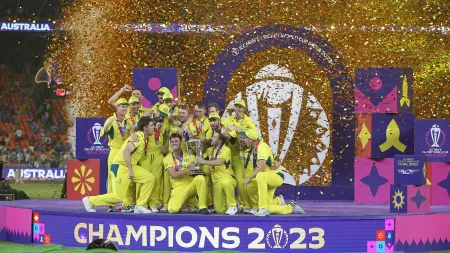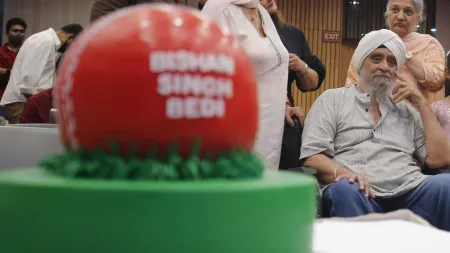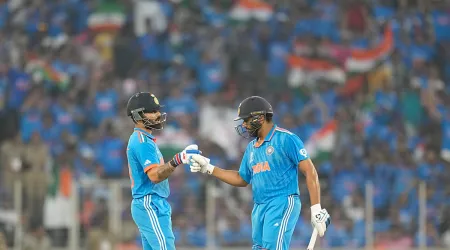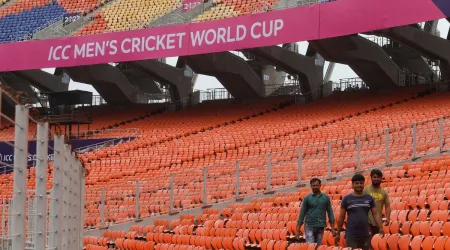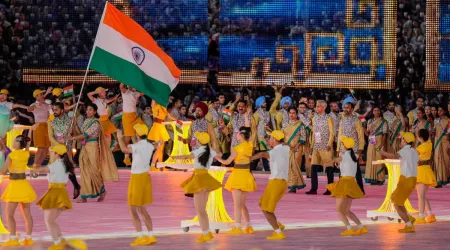- India
- International
Money they are giving us now… better if even small percentage of it was put into facilities: Sakshi Malik
Sakshi Malik's bronze in the 58 kg category at the Rio Olympics got her the country’s highest sporting honour — the Rajiv Gandhi Khel Ratna.
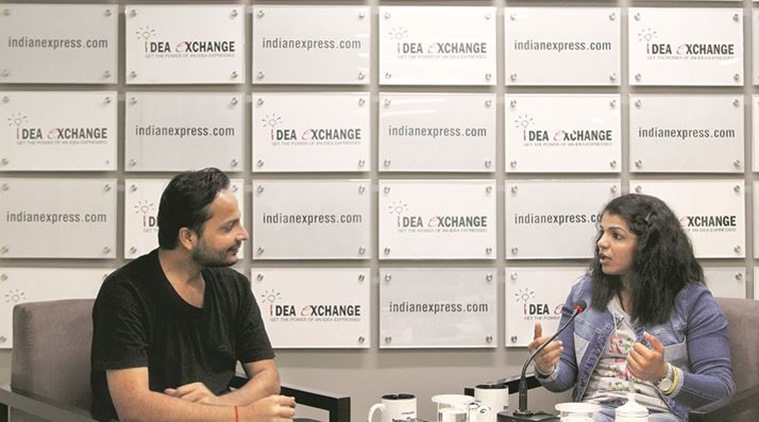 Wrestler Sakshi Malik with Special Correspondent Mihir Vasavda at The Indian Express office. Abhinav Saha
Wrestler Sakshi Malik with Special Correspondent Mihir Vasavda at The Indian Express office. Abhinav Saha
Why Sakshi Malik?
Sakshi Malik, a 24-year-old from Rohtak, is the first Indian woman wrestler to win an Olympic medal. Her bronze in the 58 kg category, one of the two medals India’s biggest-ever Olympic contingent secured at the Rio Games, got her the country’s highest sporting honour — the Rajiv Gandhi Khel Ratna. Sakshi is also the brand ambassador for the ‘Beti Bachao, Beti Padhao’ campaign in Haryana, a state infamous for its skewed gender ratio. She says she is concerned about the obstacles women wrestlers face.
MIHIR VASAVDA: What has been tougher: training for the Olympics or the felicitations and travelling that came after the medal?
The travelling has definitely been tougher. After travelling to different parts of the country, being felicitated… I now feel I have done some good work.
SAHIL MALHOTRA: At one point, you were trailing in the bronze bout. What was going on in your mind during the last 10-12 seconds of the match?

It all happened in nine seconds. The time was 5:51 and the bout was six minutes long. I stood up and looked at the stopwatch and saw that there are nine seconds left. All I thought then was that after coming this close, I don’t want to go back without a medal. In wrestling, I’ve seen bouts change in two seconds. Here, I had nine. I was lucky my final attack was successful.
MIHIR VASAVDA: In such moments, most athletes say they go blank and trust their instinct. How much could you strategise during the final seconds and how much of it was instinct?
There is very little time to think, action needs to be taken immediately. My mind was full of thoughts then: ‘You have come this far, everyone is watching you, you cannot go back after getting so close to the medal’.
MIHIR VASAVDA: That day, Indian players had lost in all the games. Was that playing on your mind?
Yes, that did affect me. All Indian athletes were living together at the (Olympic) village. When we would walk around and pass by the athletes of other countries, I would feel really embarrassed, because India didn’t have a single medal then. I had a lot of belief in myself. People didn’t. I had dreamed of being part of the Olympics for several years and I was confident of making a mark.
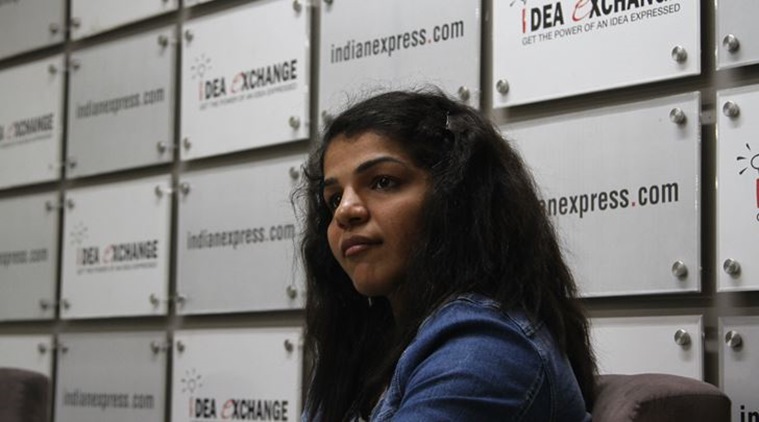 Sakshi Malik, a 24-year-old from Rohtak, is the first Indian woman wrestler to win an Olympic medal.
Sakshi Malik, a 24-year-old from Rohtak, is the first Indian woman wrestler to win an Olympic medal.
SANDEEP DWIVEDI: After all the felicitations and travel, how difficult will it now be to go back to the grueling training schedule again?
The training is hard… really painful. But I love wrestling, I really enjoy it, so it is fine. I don’t go to weddings and family functions if I can’t get back in time for practice. It’s always tough in the beginning. Like now, it has been almost 25 days and I’ve done nothing. It takes a while to get back to the pace, but eventually, I enjoy it.
SANDEEP DWIVEDI: What is your next goal?
It was a dream to go to the Olympics and bring home a medal. Now I want to go to Tokyo (2020). I always wanted to go to Japan and I’m lucky that the next Olympics are being hosted by them.
MIHIR VASAVDA: You said you have always wanted to go to Japan. Why is that?
When I began wrestling, our seniors told us that girls from Japan and China are the strongest. We always lost to Japan and China. Somewhere it got stuck in my mind, and whenever I went for international competitions, I hoped that I didn’t have Japanese and Chinese athletes in my pool. Secondly, they have excellent facilities. Their coaches, physiotherapists are very good. I have also heard that the training there is good.
SANDEEP DWIVEDI: Is it difficult to communicate with wrestlers from other countries?
It’s easy to talk to athletes from the US and Canada, but it is quite difficult when one has to converse with athletes from Japan and China. All of us know some words in English, so we manage. At other times, we use Google Translate and it is great fun.
MIHIR VASAVDA: Wouldn’t it be tough to defeat Japanese athletes on their home turf in the next Olympics?
It will be tough. Wrestling on your home turf is always an advantage. The country which hosts the Games is most likely to win most of the medals. But then we have to give our best, the rest is luck.
MIHIR VASAVDA: Do you think your medal will inspire other girls from Haryana to take up the sport?
When I began wrestling, there were very few girls in the sport. Now their numbers have increased so much that we can’t even train together. The coach has to give us different time slots. Things are definitely changing on the ground. Many parents ask me about my diet, how their daughters should train etc.
MANEESH CHHIBBER: Compared to the 2012 Olympics in London, we won fewer medals in Rio. What do you think the government must do to improve the performance of our players?
We won six medals in the London Olympics. This time, we were hoping for at least 10-12 medals. Some medals were lost by a narrow margin — Dipa Karmakar (gymnastics), Sania Mirza (tennis mixed doubles), Abhinav Bindra (shooting).
I can’t speak about other sports, but for wrestling, conducting more camps outside the country will help the athletes. Fighting more competitions outside the country will help us get more experience and reduce our nervousness. We only go for two competitions in a year — Asian Games and Commonwealth Games. For the rest of the year we train at our centres.
MIHIR VASAVDA: All the Olympic winners, including you, have been given huge sums of money by various governments, as a reward. But don’t you think this should have been part of the training budgets of athletes?
Absolutely. The amount of money they are giving us now, if even a small percentage of it was put into the facilities provided to players, then things would’ve been much better. For example, there are no stadiums in villages for girls to train. Everyone has to go to the city to train. They take two hours to just get to their training venue. Many girls have asked me to urge authorities to provide them with better equipment, wrestling mats and boxing rings. If your athletes win, give them awards. But before they do that, if there is some attention to the facilities, of course there will be better results. I see girls in torn T-shirts, without proper gear… they are all so talented. We need to help them.
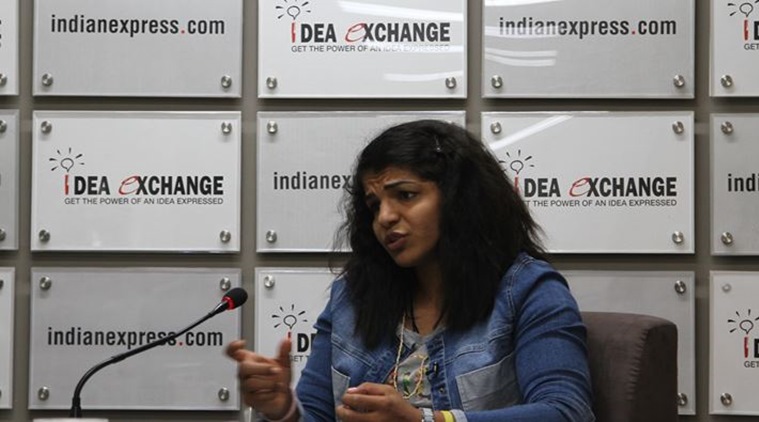 Sakshi is also the brand ambassador for the ‘Beti Bachao, Beti Padhao’ campaign in Haryana, a state infamous for its skewed gender ratio.
Sakshi is also the brand ambassador for the ‘Beti Bachao, Beti Padhao’ campaign in Haryana, a state infamous for its skewed gender ratio.
SHEELA BHATT: Apart from wrestling, what are the other things you are fond of? Who inspires you?
I was very fond of sports activities from the beginning. In school, I played basketball and table tennis. I had heard of Sushil Kumar (wrestler, won a silver medal at the 2012 London Olympics and a bronze at the 2008 Beijing Olympics) and many other athletes… I always wanted to be like them. When Sushil Kumar won a medal in 2008, that is when I realised how big a platform the Olympics really are. So yes, he (Sushil Kumar) has been an inspiration, he opened the road for us.
MIHIR VASAVDA: If Geeta Phogat hadn’t got disqualified this time, then the Federation would have probably given her another chance. (Phogat was disqualified after failing to turn up for her repechage bout, despite several announcements by the organisers, during the Olympic Qualifying Tournament in Ulaanbator, Mongolia). Do you think the wrestling selection policy needs a change?
Our selection happens properly. I don’t think it was luck. There were trials held to decide who would go for the qualification rounds. I had won the 58 kg trial. Geeta didi and other athletes were there as well. I won those trials. So who got the opportunity to go? I did. When I went for the qualifying rounds, I lost.
So the Federation decided that since she (Phogat) had qualified in the Olympics before, she could perform better this time. She was lucky that she got one more chance. She had already qualified for the Olympics in 2012 and she had more experience than me. So she got her chance.
Also, she wasn’t disqualified. It was the bout before the finals and she lost before reaching the finals. I didn’t want to let go of my last chance because I knew that after this I would have to wait for another four years. It’s not like the selection policy is messed up… You can’t cheat much in wrestling. Probably one point here and there, but blatant cheating is impossible.
SAHIL MALHOTRA: Do you think there is too much hype around the Olympics, which is sometimes used as an excuse by players. After every event, we hear people say things such as, ‘it was the player’s first time, the Olympics are very tough’ etc. But the Rio Olympics was your first time too.
This was a big deal for me… the thought had been put into my mind as well. People said, ‘It is the Olympics, no one knows what happens there, top athletes from all over the world participate’… Also, to be able to win in my first attempt seemed like a very big deal.
Before the Olympics, we got the opportunity to compete and train with the other participating athletes. Many camps were held, I went to the one in Spain. I tried to get as many competitions as possible to ensure that the Olympic hype was wiped out from my mind. Fortunately for me, there were many women of my weight who had come for training in Spain. The camp was held for 10 days, and during the competitions there, one of my opponents was a world champion. That helped me realise that it (Olympics) wasn’t a big deal and I was worrying unnecessarily.
If we have such camps every year, our performance is bound to improve. I have attended a lot of camps outside and there I have noticed that women from other countries don’t train as well as we do. The only difference is that they play freely, there is no pressure on them. We (Indian athletes), on the other hand, are tied down.
MIHIR VASAVDA: Before the Olympics, was there a lot of pressure or did you just follow your daily routine?
There was a lot of pressure before the qualifiers. Training was the most important thing, we couldn’t see beyond it. Every morning when I woke up, all I could think of was the Olympics. And after qualifying, don’t even ask what happened… I would just tell myself to give it my best shot.
SANDEEP DWIVEDI: Do you think there is too much focus on cricket and cricketers in India? All the attention you are getting now has come after an Olympic medal, whereas even an IPL player thinks of himself as a celebrity.
In comparison to wrestling, yes, there is a lot of focus on cricket, and sports such as badminton and lawn tennis. The players (in these sports) are always in the limelight. In fact, I have always complained about this trend. Just look at the previous three Olympics, it is always the wrestlers who get the medals. Despite that, wrestling is not considered on a par with the other games. What are we (wrestlers) lacking in? I always raise these questions in my
interviews.
SANDEEP DWIVEDI: Do you think that’s because people don’t understand the game too well, its technical aspects? It is only about whether a player has won or lost. In cricket, however, there is a dissection of every move, followed by discussions.
I fight five to eight bouts in a day. In other games, athletes play for a day and for the next two days, they don’t do anything. If my five bouts were spread out over more number of days, then people would get the time to understand the game. In boxing too, matches are spread out over two-three days. But I am confident that people will slowly get to know the sport (wrestling)… Movies are helping in spreading that message too.
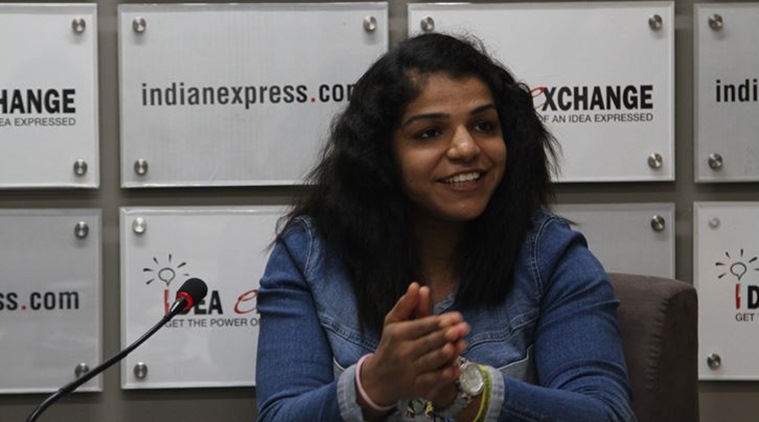 Her bronze in the 58 kg category, one of the two medals India’s biggest-ever Olympic contingent secured at the Rio Games, got her the country’s highest sporting honour — the Rajiv Gandhi Khel Ratna.
Her bronze in the 58 kg category, one of the two medals India’s biggest-ever Olympic contingent secured at the Rio Games, got her the country’s highest sporting honour — the Rajiv Gandhi Khel Ratna.
VINAY SIWACH: How important is muscle memory in your sport?
We have only six minutes, there is very little time to plan your next attack. Muscle memory develops with training. It is the muscle memory that helps an athlete react during a bout — when to defend, when to counter-attack. It comes after years of training.
MIHIR VASAVDA: Former women’s hockey captain Ritu Rani got married, and then there was news of some tiff with the federation, and finally she announced her retirement. How important is continuity in a woman’s career? Men don’t have to worry about it much.
Mary Kom (boxer) continues to play despite her marriage and children. In other countries too most of the women are married and have children. So, clearly (being married) is not a problem. It is an Indian mindset that if you get married then it’s the end. There is a lot of pressure on girls here. Earlier in wrestling, women players had to get a ‘boy cut’ because it was believed that if she had long hair, she would not be able to perform. Even I thought the same, and had a ‘boy cut’. Later, when I began growing my hair, I wondered if my performance would be affected. But just look at other countries, all women wrestlers have long hair, including the champions. All these perceptions are just there in Indian minds.
KUMAR ABHISHEK: The Narsingh Yadav doping case made a lot of news this year. How credible is the player’s defence when he says that it was a conspiracy or that he took the drugs by mistake?
We have no doctors to tell us about when to have which supplement. I am not talking about the supplements that are banned. Players must be shown the supplements, and we should be told when to take them, before the training or after it. This will make a big difference.
Also, we need to ensure that we have water from sealed water bottles and that our supplements are locked. As far as Narsingh Yadav’s case is concerned, he was a very strong opponent and had a chance of winning a medal (The Court of Arbitration for Sport banned Yadav for four years in August). I am not sure sure what happened, but he is very innocent.
JONATHAN SELVARAJ: Wrestlers in the US, Russia are very educated and some even run their own businesses. But in India, wrestling is often considered a village sport.
Players should never give up on their education. If they continue to study simultaneously, it will also help them improve in the game. I have experienced it myself. I tell girls all the time not to give up on their education… do it side-by-side. It also helps in better communication.
HARISH DAMODARAN: What do you think is the reason for the poor sex ratio in Haryana?
Earlier, there was a lot of discrimination in the state — boys were put on a pedestal and people weren’t very happy when girls were born. I do not understand why this was the case. Women are ahead of men in many fields, even now with our performances (in the Olympics), we have proved that girls are better. The mindset is changing slowly. Many girls want to take up wrestling now, many parents come and speak to me. In the future, the sex ratio will improve too.











